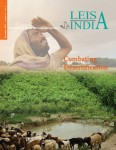Ecology and Environment
Process of formation of Jajmau Area Water Partnership in Kanpur, Uttar Pradesh – Problems and solutions
Posted on 13 Jan, 2013 12:01 PMIndustrial effluents and sewage water are being diverted to the river Ganga by the cities and towns through which it passes. Nestled on the banks of Ganga, Kanpur, a highly urbanized and industrial city is polluting it most. Apart from the Government of India’s recently constituted National Ganga River Basin Authority, civil societies and NGOs too are putting rigorous efforts to make Ganga pollution free. Though the city has several big and small industries, the leather industries located in Jajmau, the oldest part of the city add to the problem of pollution in the river to a large extent.
Studying climate change in India- A book review in Economic and Political Weekly
Posted on 12 Jan, 2013 10:44 PMThis article in Economic and Political Weekly is a review of the edited book Handbook of Climate Change and India: Development, Politics and Governance by Navroz Dubash. The author of the article states that the book is an important addition to the body of knowledge on the subject of climate change. The articles in the book are written from diverse view points by authors who are activists, researchers, diplomats, policymakers, and politicians.
Greening rural development in India - A report that reviews and recommends steps on goverment implemented green schemes
Posted on 11 Jan, 2013 07:49 PMRecognizing the national and global imperatives for regenerating natural resources and conserving ecosystems, the Ministry of Rural Development requested UNDP to examine the environmental implications of its schemes and assess the potential of these schemes to deliver green results.
Traditional diversion-based phad irrigation systems help mitigate risk of crop failure in the drought-prone farmer suicide belt of Vidarbha, Maharashtra
Posted on 11 Jan, 2013 11:56 AMMany of these systems (1) continue to function and are often more sustainable, cost-effective and successfully managed by local institutions. Phads are one such community-based and managed diversion irrigation management system (2) prevailing in the north-western part of Maharashtra and date back to the early 16th century as per historical accounts. The system is prevalent in the Tapi basin on rivers the Panjhra, Mosam and Aram in Dhule and Nashik districts (3).
Phads or diversion-based irrigation systems, are being revived and promoted in Vidarbha region of Maharashtra by Dilasa, a Yavatmal-based voluntary development organisation (Video courtesy: Dilasa)
Report on Greening of the NRDWP: News and Policy Update from India WASH Forum e-Newsletter-Dec 2012
Posted on 11 Jan, 2013 07:44 AM Gender in WASH: Misplaced perspective in WASH sector
Gender in WASH: Misplaced perspective in WASH sector
AnRak Aluminium in Visakhapatnam, Andhra Pradesh: Another Vedanta in the making ? – An article in EPW
Posted on 10 Jan, 2013 10:35 PMThis paper in Economic and Political Weekly (EPW) by Patrik Oskarsson deals with the bauxite (aluminium) project which is very similar to the Vedanta project in Odisha and is coming up in Visakhapatnam district of Andhra Pradesh.
AnRak Aluminium, a company of the government of Rasal-Khaimah of the United Arab Emirates and Penna Cement of AP has secured approval for both an aluminium complex and the bauxite mines, but the final forest clearance for the mines is awaited.
The AnRak project has replicated the Vedanta model of first building the refinery and then setting up the mine. The mine is to be operated by the state government to circumvent the ban on non-tribal landownership.
LEISA magazine special issues in Hindi, Tamil and Telugu - A compilation of selected articles on combating desertification
Posted on 10 Jan, 2013 12:08 PMLow external input and sustainable agriculture (LEISA) India has come up with a collection of alternative ways of combating desertification in the fragile region of the country in its recent issue. The articles are success stories of such intiatives by farmers and NGOs.
Sand mining – An unexamined threat to water security
Posted on 09 Jan, 2013 08:12 PMSand is a resource whose economic value belies the crucial role it plays in our lives. The process of development in India has so far not taken into account the environmental and social consequences of indiscriminate sand mining.






